The Skylarks Song
I was instantly captivated by Georgie - I knew I had to get to know her better...
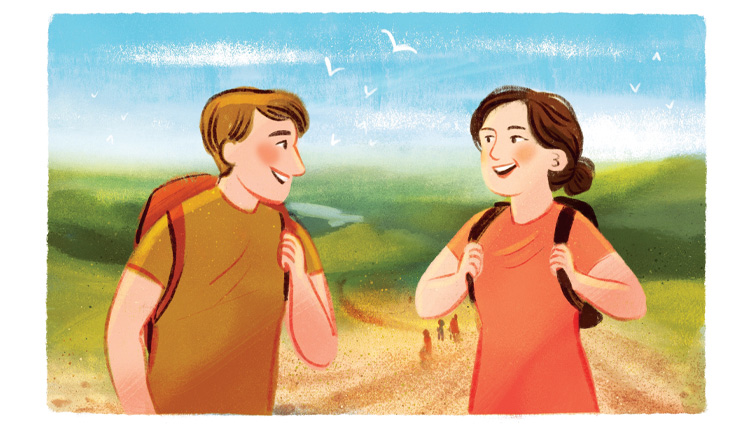
Illustration: Sarah Holliday.
Subscribe to The People’s Friend! Click here
I was instantly captivated by Georgie - I knew I had to get to know her better...

Illustration: Sarah Holliday.
A ROMANTIC SHORT STORY BY WALLY SMITH
I was instantly captivated by Georgie – I knew I had to get to know her better…
limbing Snowdon by way of the Llanberis Path is fairly straightforward, even when the rain in June is doing its best to deter hundreds of charity walkers who turn up each year to raise much-needed funds.
I had first taken part in 2003, and this was the third year that I had done the cancer charity’s weekend climb, and amazingly the first one when the weather was fine.
Snowdonia National Park is beautiful whatever the weather, but is clearly more enjoyable when warm sunshine bathes the mountainside and the only sounds disturbing the tranquillity are the crunch of boots on the stony track.
I generally tag along with another group to pass the couple of hours it takes to make the ascent, and that is how I came to meet Georgie.
She caught me by surprise when she came up beside me.
“Hello. Have you done this walk before?” she asked.
I’ve never been that good with the opposite sex and I became quite tongue-tied.
“Er, yes, a few times,” I replied.
She was very pretty and chatty, and she seemed to be really enjoying the day, as though she had never walked a mountain before.
I was soon to discover that she had not.
She hardly stopped talking, asking me how far I had travelled, what I thought about life and the countryside, and a dozen other subjects that I wish I could remember.
I must confess that I was smitten in those few moments.
The time passed by so quickly that we were nearly at the summit before I had a chance to find out much about herself.
It was at that moment that she stopped suddenly and turned her head to the sky.
“Can you hear that?” she said.
“You mean the skylark?”
“Is that what it is? I can’t actually see it.”
She was peering into the blue sky, trying to pinpoint where the trilling sound was coming from.
“I’ve never heard one before. It’s beautiful,” she remarked.
“It certainly is. You’ve never heard one before?”
“No. I’m a city girl, and I’ve not been able to get out an awful lot.”
It was then that the rest of her group called for her to catch up.
I didn’t want our conversation to end so I tried to think of something more to say.
“Did you know that the composer Ralph Vaughan Williams wrote a piece called ‘The Lark Ascending’?” was all I could come out with.
I immediately regretted saying something so inane, but then, to make matters worse, I followed it up with a poetry quotation.
“For ever hanging on the wing, hidden high beyond the throng, hear the tiny skylark sing, exulting in its special song.”
She looked surprised, then smiled and turned to catch up with her group.
“Nice,” she commented. “I like that. I’ve got to go now. Sorry. ”
“It was nice to meet you,” I said, and stood reflecting on what had just happened.
I stared at the sweep of the valley below instead of following her.
I thought that I would see her on the way down the mountain and be able to continue our conversation, and be able to say something less embarrassing, but I didn’t see her again.
It was impossible to get Georgie out of my mind and, on the same charity walk the following year, I spent most of the time either overtaking groups or hanging back trying to find her.
It was near the summit when I heard the skylark again, reminding me of the very short but very wonderful chat I had had with Georgie.
At the summit, I sat with the groups of other walkers, and I noticed that some of them were wearing T-shirts with the legend: Climbing for Georgie – National Leukaemia Trust.
My heart sank.
I approached one of the group members – a young man called Tony – and asked if it was the same Georgie I had spoken to on the previous year’s climb.
He asked how I knew her, and I explained that we had chatted only for a short time but that I had never forgotten what an amazing person she was.
“Yes, that certainly sounds like Georgie,” Tony replied when I told him the impression she had made on me. “She wasn’t well enough to make the climb this year.
“She was diagnosed with leukaemia when we were kids and has spent a lot of time in hospital undergoing treatment.
“Our little group started this to raise funds for her treatment, but she was so determined last year to be a part of it, that she joined us on the ascent.
“Then she had to take the train on the way back down,” he explained.
“Ah, that’s why I couldn’t find her afterwards.” I nodded.
It was obviously clear to Tony that I wanted to see her again, and he told me that she was now in the Reedham Clinic if I wanted to visit.
“She’s always very happy to have visitors,” he said, “because she might not be able to come on any more of these walks.
“It’s quite an aggressive form of cancer. She’s been in and out of hospital a lot since she was very young. Last year was a bit special for her.
“She was responding to the therapy and the weather was set fair and she wanted to . . .
“Well, she insisted that she come with us.”
He laughed, picturing, as I did, the strong-willed person I had only met for that very brief time one year ago.
“How is the therapy going now?” I asked, but I did not really want to know the answer.
“We’re all hopeful,” was all that Tony said.
His gaze wandered to the sweep of the valley below, wondering, as I did, how she was at that moment.
“Are you sure it will be all right if I went to visit her?” I asked.
“Absolutely. You can tell her all about this year’s climb, because she will definitely want to know.”
I had heard of the place, which was a high-profile clinic dealing with cancer patients.
It was one of the best in Europe, but also about two hundred miles from where I lived.
I knew I wanted to see her, but what if I got there and she was not allowed visitors?
Would she actually be pleased to see me, or would I just be intruding?
It might just have been out of politeness that she was talking to me the previous year.
And it was at that moment that I heard it again.
The skylark. Its song seemed to be urging me on to do what I wanted, despite all my doubts.
“It’s Farmer, by the way,” Tony said.
“What?”
“Georgina Farmer. You’ll need to know that, won’t you, if you’re going to see her?
“I assume that you are going to pay her a visit?”
He was smiling as he asked the question, and clearly saw how much I wanted to see her again.
“Oh, yes, of course.”
It was not long after I had returned from Snowdon that I managed to book some days off work.
I soon found myself driving towards Reedham, my mind filled with all sorts of scenarios, most of them disastrous.
What if Georgie’s family were there and didn’t particularly want me, a stranger, turning up?
What if she was too poorly to see anyone?
Far too many “what ifs”. The story of my life.
I was considering that, on balance, I should not have really started out on the journey, when, just as timely as the skylark’s intervention had been on Snowdon, Classic FM on the car radio began playing Ralph Vaughan Williams’s “The Lark Ascending”.
Coincidence? I was beginning to think that a greater force was at work.
I had to face the fact that all through my life I had always needed a greater force to motivate me.
I drove on with a renewed confidence in what I was doing.
Reedham Clinic’s pastoral setting was as tranquil as the Welsh mountainsides.
It had very modern features, but retained a comfortable elegance in beautiful landscaped grounds, and had probably been a stately Georgian manor house.
The gravelled drive and entrance would have not looked out of place in a period drama setting.
The reception area inside the front doors, however, was in stark contrast, with glass partitions and shiny steel surrounds enclosing a broad desk where a receptionist greeted me.
“Good afternoon. How may I help you?” she asked.
“I’m looking for
Georgie . . . Georgina Farmer?”
“And you are?”
“A friend.”
“Room twenty-seven on the first floor. And if you could just sign the visitors’ book, please.”
As I went up the wide staircase, I was still unsure as to whether I was doing the right thing.
But I was encouraged by what Tony had told me and hoped I would be a welcome visitor.
I found her room and looked through the glass window panel.
Georgie was lying in bed.
She looked pale and there were dark shadows under her eyes – a far cry from the vivacious girl I had met on the mountain.
There was a couple at her bedside, who I assumed were her parents.
They looked up as I stood in the doorway.
“Hello,” was all I managed to say.
Georgie slowly turned her head in my direction.
She smiled.
Oh, it’s the skylark guy!
Her parents seemed a little confused.
“This is the young man I was telling you about who I met last year,” she explained, then turned to me. “I didn’t get to find out your name.”
“My fault, I reckon. Simon Williams.” I smiled.
“No relation to Ralph, then?” Georgie asked with a laugh.
“Wow, you’ve got a good memory,” I replied.
“Well, you made quite an impression,” she said.
If only I’d known that at the time, I thought, it might not have been a year before I saw her again.
At least I was here now.
“You made quite an impression on me, too.
“It was your friend, Tony, who told me your circumstances, and I thought I’d come and see how you were.”
Georgie’s parents seemed pleased that I had come to visit.
“You two carry on chatting while me and Mum get ourselves a cup of tea,” her father said. “Very nice to meet you, Simon.”
When they had gone, Georgie completely stunned me by quoting:
“For ever hanging on the wing, hidden high beyond the throng, hear the tiny skylark sing, exulting in its special song.
“They’re your words, aren’t they?” she asked.
“How did you work that out?” I asked her.
“I have nothing to do here all day. I searched for hours but couldn’t find out where the lines came from, so I assumed you made them up. Am I right?”
“Guilty,” I admitted. “I made them up on the spot. Very embarrassing.”
“I must be your poetry muse,” she said and we both laughed. “The words are lovely, and so was the sound of that skylark. Was it there again this year?”
“Yes, same place. It made me think about you. That’s how I got to speak to Tony.
“I’m sure it will still be there next year. I’ll try to make a recording of it for you,” I told her.
“Thank you.” Georgie smiled. “Sit down and tell me all about yourself and what you’ve been doing the past year.”
“Me?”
“Yes, we’ve got a lot of catching up to do. Maybe you can teach me how to write poetry, too . . .”
Enjoy short stories every week within the pages of ‘The People’s Friend’
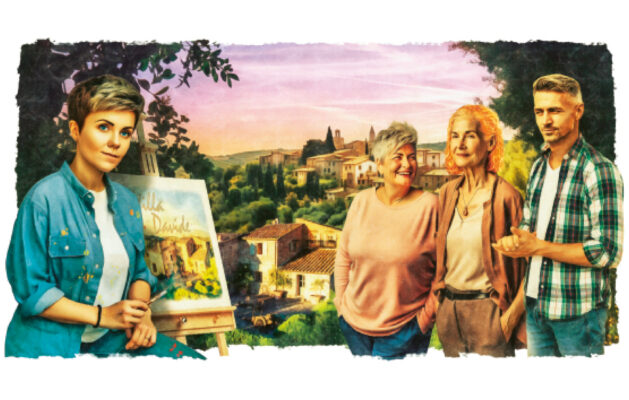
Sue Cook
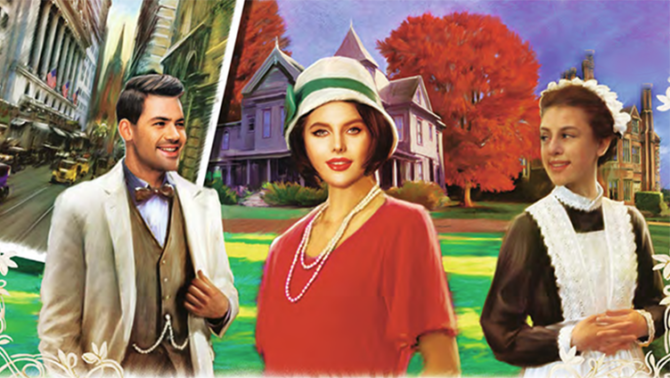
Katie Ashmore
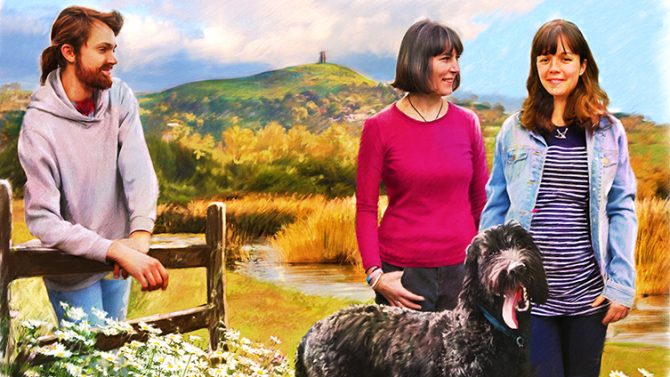
Paula Williams
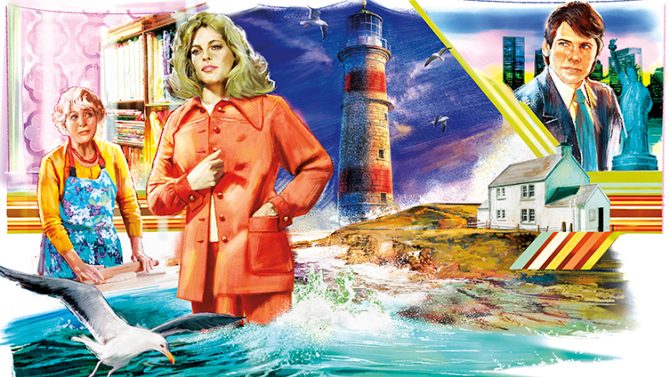
Deborah Siepmann
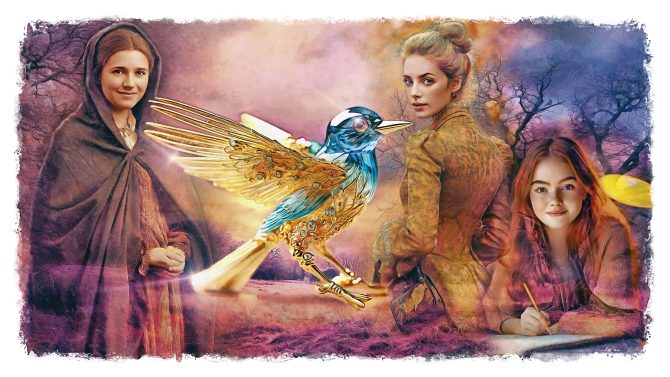

Alison Carter


Teresa Ashby

Beth Watson

Alyson Hilbourne

Katie Ashmore

Kate Hogan